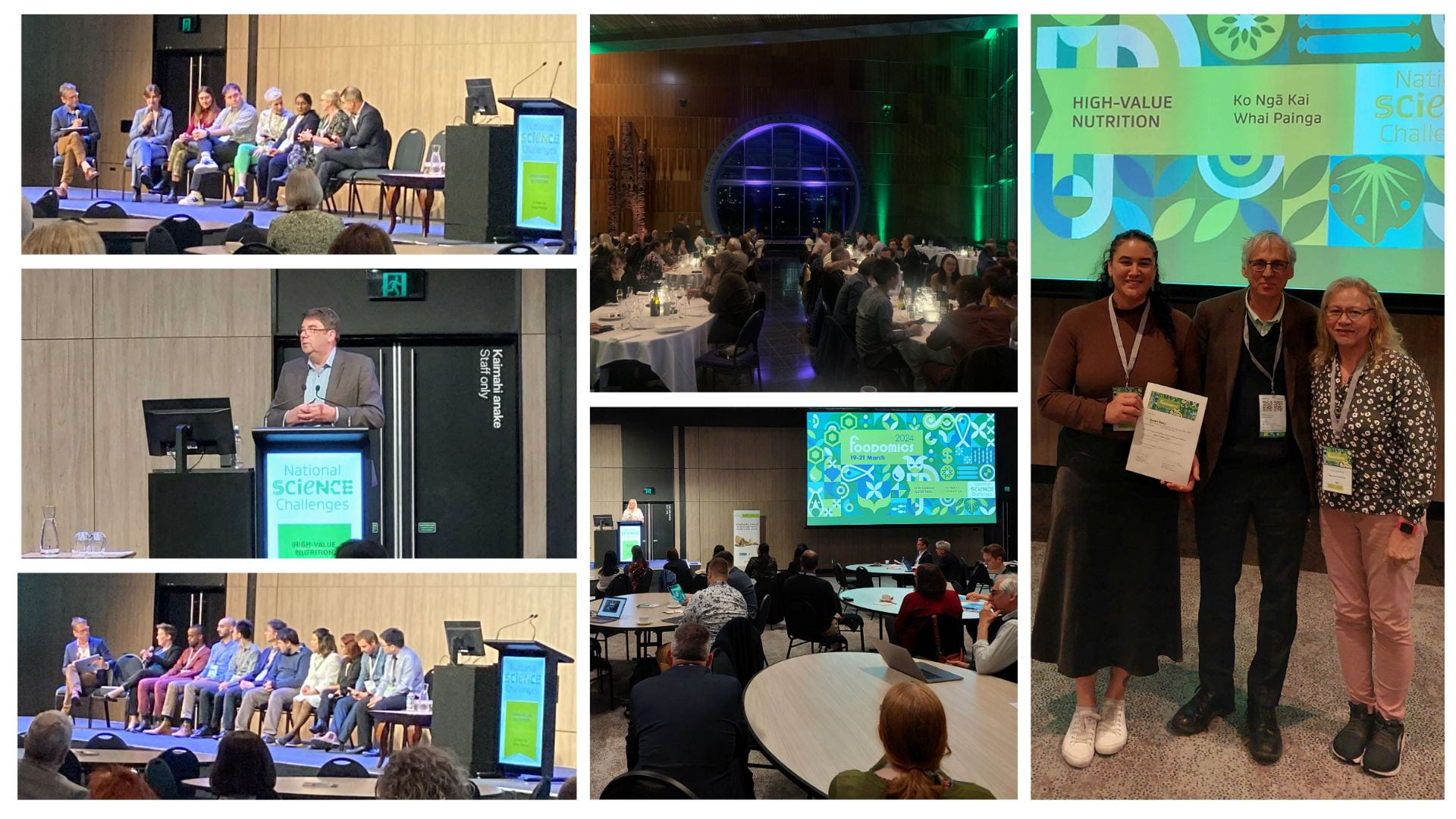
More than 180 delegates from across science, the Food and Beverage (F&B) industry and government came together to celebrate 10 years of the High-Value Nutrition National Science Challenge at Foodomics 2024. Over 70 speakers shared their achievements and successes with the Challenge.
From its inception, HVN was structured around six Priority Research Programmes (PRP): Digestive Health; Metabolic Health; Immune Health; Infant Health; Consumer Insights; Science of Food.
Aligned to each of these are a series of contestable projects, each with an academic and commercial partner. These research programmes are complemented with the He Rourou Whai Painga study, which is a community-based whole-diet intervention study.
It was fitting that the Foodomics programme followed this structure, with seven main sessions introduced by the PRP leader, followed by a series of presentations from PRP research scientists and industry partners, and the academic and commercial partners from contestable projects.
Whilst each session focused on different aspects of health, there were common themes: all the programmes had engaged in training many Masters and PhD students and had greatly benefited from undergraduate interns recruited through the Pūhoro STEMM academy, and many of the contestable projects across the programmes were led by Māori businesses and involved exploring the potential nutritional qualities of native species.
The collaboration between the programmes was very evident, especially in research in how the gut microbiome may modulate several aspects of our health and wellbeing.
The future of science and innovation was showcased throughout the programme, with presentations from students and early career scientists, including many young Māori scientists.
Whakaaro Mōhio | Our Smartest Minds profiled the work of Māori masters and PhD students whose work has been supported by HVN scholarships. The often-inspiring presentations gave an insight into the far-reaching impact these students’ research can have on not only the Māori economy but also the students’ iwi (and iwi whenua) and whānau.
Digestive Health was introduced by Professors Nicole Roy and Richard Gearry of the University of Otago, followed by a series of presentations focusing on the outcome of human intervention studies with different New Zealand F&B products that were undertaken both within the PRP and in a series of aligned contestable projects. These included presentations on laxative effects of consuming two gold kiwifruit daily with potential cognition benefits, the colonic osmotic effects of consuming two green kiwifruit daily, establishing new physiome methods that showed gastrointestinal physiological response patterns of consuming New Zealand F&B products and developing new clustering methods to classify people with disorders of gut-brain interactions.
Immune Health was introduced by Dr Olivier Gasser of the Malaghan Institute, followed by presentations on the science and theory underlying the newly established metabolic flow cytometry (MetFLOW) platform, and on aspects of an intervention study using the Traditional Chinese Medicine indigo naturalis, used as a proxy to investigate how foods containing bioactives that interact with the arylhydrocarbon receptor to modulate the immune system in humans, a topic of broad relevance for NZ F&B products. There followed presentations from aligned contestable projects, including those exploring how polyphenolic-containing beverages may limit pulmonary inflammation both in sedentary people and athletes, how omega-3 fatty acids in marine products may alleviate joint and tendon inflammation, and the potential benefits of deer milk for nutrition in the elderly.
Metabolic Health was introduced by Associate Professor Jennifer Miles-Chan of the University of Auckland, followed by presentations on the SYNERGY residential nutrition study, the science of indirect calorimetry and its importance in diabetes prevention, and the FERDINAND intervention study that seeks to evaluate the possible beneficial effect of feijoa on metabolic health. Contestable project presentaions included those of the role of kawakawa, a food product manufactured from greenshell mussels and fucoidan, and a hydrolysate of whey protein on metabolic health.
Infant Health was introduced by Professor Clare Wall of the University of Auckland who discussed the challenges of undertaking nutrition intervention studies with infants especially during the Covid-19 pandemic. A subsequent series of presentations explored different aspects of how diet may modulate the development of the infant gut microbiome and sleep patterns.
Consumer Insights was introduced by Dr Denise Conroy of Plant and Food Research, with a focus on the research undertaken within the He Rourou Whai Painga community-based study. The presentation illustrated the importance of integrating social science into a clinical trial to explore the issues that may limit behavioral change, and the value of social science insights to refine experimental protocols.
Science of Food was introduced by Distinguished Professor Harjinder Singh of the Riddet Institute. The expertise within Professor Singh’s team in food structure and encapsulation technology was well illustrated by progress within the contestable project with Calocurb, which seeks to develop a highly palatable food product containing the bitter-tasting appetite suppressor Amarasate™. Further talks discussed nutritional content of several food products including New Zealand grown peanuts and the chemical profile of Coprosma and Kanuka.
He Rourou Whai Painga was introduced by Professor Jeremey Krebs who discussed the design of the study, which involves providing an Aotearoa New Zealand diet for enhancing metabolic health to 200 individuals and their whanaū. Subsequent talks focused on the involvement of many commercial partners in the study, the development of automated methods for recording diet, and the possible importance of the microbiome in maintaining metabolic health.
The three-day symposium had a positive energy, reflecting the breadth of work that a mission-led programme supported by industry can achieve. There is still much to be completed in each programme, with results and findings to be published. We expect the impact of this research for our scientists and industry partners to continue in the years to come.